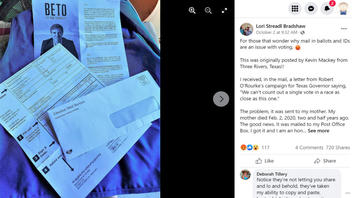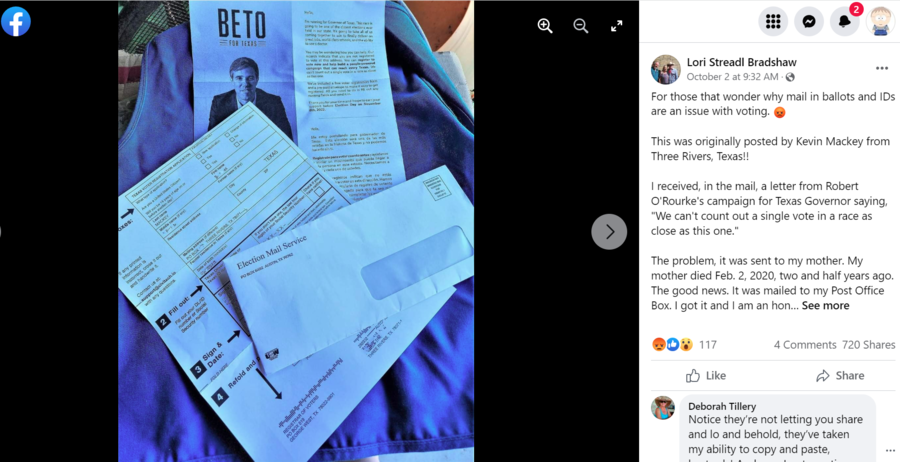
Is it possible to cheat the mail-in ballot elections system in Live Oak County, Texas, and vote on behalf of a deceased person? It's possible, but it would be extremely difficult. Many safeguards are in place to prevent that from happening. In a phone interview with Lead Stories, Live Oak County Voter Registrar Deanna Atkinson said there are "a lot of checks and balances, so I feel pretty comfortable with what we do." The Texas secretary of state's office also has an extensive validation system and specific requirements that limit voting by mail.
The claim appeared in a Facebook post by Lori Streadl Bradshaw on October 2, 2022. It opened:
For those that wonder why mail in ballots and IDs are an issue with voting.
This is what the post looked like on Facebook at the time of writing:
(Source: Facebook screenshot taken on Mon Oct 17 15:55:30 2022 UTC)
On social media
The lengthy Facebook post is a copy-and-paste of an October 1, 2022, post by Kevin Mackey, which appears below. The posts by Bradshaw and Mackey have been widely shared:
Both posts say the following:
For those that wonder why mail in ballots and IDs are an issue with voting.
I received, in the mail, a letter from Robert O'Rourke's campaign for Texas Governor saying, 'We can't count out a single vote in a race as close as this one.'
The problem, it was sent to my mother. My mother died Feb. 2, 2020, two and half years ago. The good news. It was mailed to my Post Office Box. I got it and I am an honest person.
Bad news. I am not the only one getting these for dead people. Much of the information is already filled in. A family member can easily get the other information. A stranger, now at an old address for your deceased family member, with just a little bit of google skills can too.
A dishonest recipient could fill this in and send it to the already addressed Live Oak County Voter Register's office, POST PAID, and register the deceased to vote. They then can request a mail ballot. With the numbers already provided for ID, they then can vote for the deceased person. No picture ID required.
Double-checking
In an October 17, 2022, phone interview with Lead Stories, Atkinson said it's hard to cheat the system because there are "a lot of checks and balances" in place with plenty of ways to confirm the validity of a mail-in ballot or the viability of a potential voter:
Death certificates and abstracts of deaths ... the Secretary of State has a good system that we use. It checks back with driver's license, social security number, dates of birth with names, even just the name that can come back. And, you know, it'll give us that option to go through and we check to make sure that that is the correct person.
Sam Taylor, the assistant secretary of state for communications in Texas, told Lead Stories in an October 17, 2022, email that the Texas Elections office doesn't just take the word of people who register to vote:
All voter registration applications are subject to a validation of personal information including name, date of birth, driver's license number, if applicable, and at least four digits of a social security number. This validation includes a comparison of their information to current Texas Department of Public Safety (DPS) records and Social Security Administration records. This process is called 'Live Check.' ...
Any applicant submitting such numbers that have been reported to any of these agencies (DPS or SSA) as deceased would fail the validation process and would be notified of the failure. Unless the applicant corrected the incomplete information with their county voter registrar within ten days, the application would be rejected.
To prove his point, Taylor provided a link to the state's monthly "Cancellation Trend Report," which shows how many Texans were removed from voter registration rolls for various reasons. For September 2022, the number of deceased topped 9,500. In his email, he added:
County Early Voting Clerks check to make sure that at least one of the ID numbers on the mail-in ballot carrier envelope matches a number on the voter's registration record. There is no requirement for a secondary 'check' when a voter is sent a mail-in ballot, because the list maintenance and removing deceased voters from the rolls happens at the registration stage, not at the ballot by mail request stage.
So, in conclusion, there are ample checks in the system to make sure someone cannot register and request a mail-in ballot in the name of a deceased person. There may be limited circumstances in which someone tries to 'game' the system, but again those should be caught in the normal voter registration list maintenance activities described above, which we undertake on a weekly basis with information on deceased persons we receive from the Texas Bureau of Vital Statistics and the Social Security Administration.
Barring a recent death that hadn't been reported, it would be extremely difficult to sneak the registration of a deceased person through the Texas system.
Also, applications to vote by mail must be requested, they're not automatically sent and a person must meet one of the following criteria:
- 65 years of age or older on Election Day;
- Disabled;
- Expecting to give birth within three weeks before or after Election Day;
- Absent from the county of registration during the Early Voting period and on Election Day;
- Civilly committed under Chapter 841 of the Texas Health and Safety Code; OR
- Confined in jail, but otherwise eligible.
The secretary of state's website has a page dedicated to "Voting by mail in Texas," which includes this video:
Other Lead Stories fact checks on voting and election fraud can be found here.


















